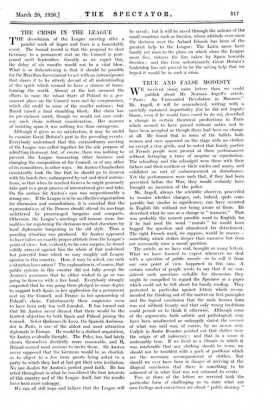"'THE CRISIS IN THE LEAGUE
THE dissolution of the League meeting after a painful week of hopes and fears is a lamentable event. The formal record is that the proposal to elect Germany to a permanent seat on the Council is post- poned until September. Greatly as we regret thiS, the delay of six months would not be a vital blow. What is so disheartening is that it should be possible for the Brazilian Government to act with an intransigeanee that shows it to b e utterly devoid of all understanding of the spirit which seemed to have a Chance of trans- forming. the world. Almost at the last moment the efforts to raise the infant State of Poland to a per- manent place on the Council were met by compromises, which did credit to some of the smaller nations ; but Brazil raised a final stumbling block. Her claim has no pre-eminent merit, though we would not cast aside any such claim without consideration. Her manner of insisting upon it was nothing less than outrageous.
Although. it gives us no satisfaction, it may be useful to examine "Great Britain'S part in the preceding events.
Everybody understood that this extraordinary meeting of the League was called together for the sole purpose of admitting Germany, but, of course, there was nothing to prevent the League transacting 'other business and changing the composition of the Council, or of any other of its committees, in other ways. Sir Austen Chamberlain 'consistently took the line that he should go to Geneva with hiS hands free, unhampered by cut and dried instrue- tions,.so that when he reached Geneva he might genuinely take part in a great process of international give and take. On the surface Sir Austen's case was unquestionably a strong one. If the League is to be an effective organization for discussion and consultations, it is essential that the repreeentatives "of the PoWers should attend its meetings unfettered by prearranged bargains and compacts.
OtherWise the League's meetings will become mere for- malities for registering the decisions reached elsewhere by hard* diploMatic bargaining in the old style. Thus a puzzling situation was produced. Sir Austen appeared to have taken an exactly proper attitude from the League's point of view; but, evidently to his own surprise, he found solidly arrayed against him the whole of that undefined but powerful force which we may roughly' call League opinion in this country. How, it may be asked, can such a situation have arisen ? The explanation is, of course, that public opinion in this country did not fully accept Sir Austen's assurance that he either wished to go or was going to Geneva with a free hand. Everybody strongly suspected that he was going there pledged in some degree to support both Spain in her application for a permanent seat on the Council, and France in her sponsorship of Poland's claim. Unfortunately these suspicions seem to have been only too well founded. It has turned out that Sir Austen never dreamt that there would be the faintest objection to both Spain and Poland joining the Council. Senior Quinones de Leon, the Spanish Ambassa- dor in Paris, is one of the ablest and most attractive diplomats in Europe. He would be a distinct acquisition, Sir Austen evidently thought. The Poles, too, had lately shown themselves decidedly more reasonable, and M. Briand seemed most anxious to invite them. Sir Austen never supposed that the Germans would be so churlish as to object to a few more guests being asked to a party to which they had at last got their own invitation.
No one doubts Sir Austen's perfect good faith. He has acted throughout in what he considered the best interests of this country and of the League itself, but the results have been most unhappy.
We can all still hope and believe that the League will be saved ; but it will be saved through the actions of the small countries such as Sweden, whose attitude ever since the decision over the Aaland Islands has been of the greatest help to the League. The Latin races have hardly yet risen to the plane on which alone the League must live, witness the line taken by Spain towards Sweden ; and this time unfortunately Great Britain's leadership has not proved to be the saving help that we hoped it would be in such a crisis.


























































 Previous page
Previous page